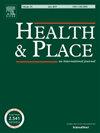Who's responsible for health during extreme heat events? An ethnographic document analysis of health promotion materials in Australia
IF 4.1
2区 医学
Q1 PUBLIC, ENVIRONMENTAL & OCCUPATIONAL HEALTH
引用次数: 0
Abstract
With increasing temperatures due to climate change, public health and health promotion bodies in Australia have increasingly developed resources to promote awareness and protect the public from heat stress risks. Utilizing an ethnographic document analysis method, this article critically examines a sample of Australian public health and health promotion online resources from the last five years. We explore how relational environments, material resources, self-care, health and routines, and informational agency are emphasized and discursively represented. Utilizing a critical public health lens and theoretical ideas of responsibilization, we evaluate the documents from a health justice perspective and consider whose experiences and realities are missing or invisible in public health advice for staying safe in the heat. We find the documents ignore the lived realities and experiences of Indigenous Australians, women, rural and remote Australians, young people, and Australians experiencing family conflict, violence, social isolation, and gendered burdens of care. They also exclude the realities of renters, workers with limited workplace control and agency, and those with low or insecure incomes. We then reimagine these documents from a climate justice and health equity perspective and suggest ways to shift the documents from a personal responsibility paradigm, to one that embeds social support and collective forms of responsibility.
在极端高温天气中,谁对健康负责?澳大利亚健康促进材料的民族志文献分析。
随着气候变化导致气温升高,澳大利亚的公共卫生和健康促进机构越来越多地开发资源,以提高认识并保护公众免受热应激风险。利用民族志文献分析方法,本文批判性地检查了过去五年澳大利亚公共卫生和健康促进在线资源的样本。我们探讨如何关系环境,物质资源,自我保健,健康和惯例,以及信息代理被强调和话语表现。利用关键的公共卫生镜头和责任的理论思想,我们从健康正义的角度评估文件,并考虑谁的经验和现实在炎热中保持安全的公共卫生建议中缺失或不可见。我们发现,这些文件忽视了澳大利亚土著居民、妇女、农村和偏远地区的澳大利亚人、年轻人以及经历家庭冲突、暴力、社会孤立和性别负担的澳大利亚人的生活现实和经历。他们还排除了租房者、工作场所控制权和代理权有限的工人以及收入低或不稳定的人的现实。然后,我们从气候正义和健康公平的角度重新构想这些文件,并建议如何将文件从个人责任范式转变为嵌入社会支持和集体责任形式的范式。
本文章由计算机程序翻译,如有差异,请以英文原文为准。
求助全文
约1分钟内获得全文
求助全文
来源期刊

Health & Place
PUBLIC, ENVIRONMENTAL & OCCUPATIONAL HEALTH-
CiteScore
7.70
自引率
6.20%
发文量
176
审稿时长
29 days
期刊介绍:
he journal is an interdisciplinary journal dedicated to the study of all aspects of health and health care in which place or location matters.
 求助内容:
求助内容: 应助结果提醒方式:
应助结果提醒方式:


